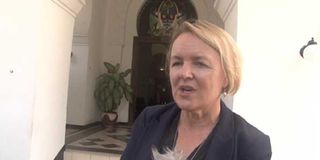WB’s focus on environment yields results

What you need to know:
- Briefing participants to a four-day workshop for the implementation of its new Environmental and Social Framework (ESF) initiative, the World Bank (WB) Country Director for Tanzania, Malawi, Somalia, and Burundi, Bella Bird said since the institution adopted the policy 20 years ago, a number of positive outcomes have been witnessed.
Dar es Salaam. The World Bank’s safeguard policy of funding projects that are environmentally-friendly, is now yielding positive results on the sustainability of the funded schemes, a meeting heard yesterday.
Briefing participants to a four-day workshop for the implementation of its new Environmental and Social Framework (ESF) initiative, the World Bank (WB) Country Director for Tanzania, Malawi, Somalia, and Burundi, Bella Bird said since the institution adopted the policy 20 years ago, a number of positive outcomes have been witnessed.
The ESF aims to sustain development projects that protect the environment.
Through the safeguard policies, the WB set the standards for Multilateral Development Banks in protection of people and the environment.
“We have seen that investment projects are more sustainable and have a greater impact when the environment is protected, and when communities are engaged,” she said.
She further added that environmental protection was one of the priorities in all development projects funded by WB and that the workshop imparted knowledge to stakeholders who will help the implementation of the new framework which is expected to commence by October 2018.
“We believe by training our clients, we facilitate the success of our plan to mitigate environmental challenges and at the same time we want to improve development projects that will enhance progress in countries,” she added.
According to the senior Environmental Specialist for World Bank-Tanzania, Ms Jane Kibasa, the World Bank’s environmental and social policies aim to ensure that people and the environment are protected from the potential adverse impacts of the projects it finances — such as building a road, connecting people to electricity, and treating waste water.
“The policies help identify, avoid, and minimize harm to people and the environment and the WB requires the borrowing governments to address certain environmental and social risks in order to receive its support for investment projects,” she said.
The ESF is the result of the most extensive consultations ever conducted by the World Bank, with nearly four years of analysis and engagement around the world with governments, development experts, and civil society groups, reaching nearly 8,000 stakeholders in 63 countries according to Kibasa.
The workshop which is stipulated for four days (May 8 to May 9) in Dar es Saalam and Dodoma brings together government representatives, development partners, and other stakeholders from civil society organizations whom are equipped with comprehensive understanding on the new environment and social requirement in which development projects will be implemented without affecting the environment.




